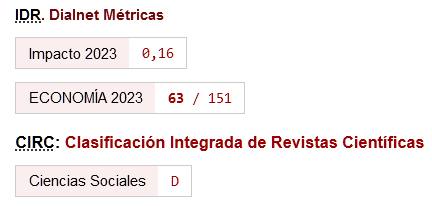Empirismo en economía ecológica:una visión desde la teoría de los sistemas complejos
Palabras clave:
Economía ecológica, empirismo, economía neo-clásica ambiental, econometría predictiva, incertidumbre, sistemas complejos, ciencia post-normalResumen
Las economías son sistemas complejos abiertos, lejosdel equilibrio termodinámico, y la economía neo-clásica no parecesiempre la forma más adecuada de describir su comportamiento. Elanálisis econométrico tradicional toma un punto de vista deterministay predictivo, que fomenta la búsqueda de políticas predictivas para“corregir” los problemas ambientales. No obstante, parece que, debidoa las características de los sistemas económicos, un análisis ex-post esmás adecuado en determinados ámbitos, pues describe la aparición delas propiedades emergentes de esos sistemas, y ve a la política comoun mecanismo de dirección social. Con esta información se presentaparte del reciente trabajo empírico publicado en la revista EcologicalEconomics que pienso sigue el enfoque descrito aquí. Además, tam-bién se mencionará un proyecto reciente en que el autor ha estado invo-lucrado pues, de nuevo, supone un ejemplo del punto de vista defendi-do aquí para el empirismo. Finalmente, se alcanzará la conclusión deque no es posible una econometría ecológica de carácter predictivo.Esto, no obstante, no implica que no se deba llevar a cabo análisisempírico. Muy al contrario, éste debe promoverse, pero desde un puntode vista ex-post y estructural
Descargas
Citas
Beard, T.R. y Lozada, G.A. (1999): Economics, Entropy and the Environment. The Extraordinary Economics of Nicholas Georgescu-Roegen. Edward Elgar. Cheltenham, UK. https://doi.org/10.4337/9781035303977
Boulding, K.E. (1987): "The epistemology of complex systems", European Journal of Operational Research, 30: 110-116. https://doi.org/10.1016/0377-2217(87)90087-7
Casler, S.D., Blair, P.D. (1997): "Economic structure, fuel combustion, and pollution emissions", Ecological Economics22: 19-27. https://doi.org/10.1016/S0921-8009(96)00551-4
Clark, N.; Pérez-Trejo, F.; Allen, P. (1995): Evolutionary Dynamics and Sustainable Development: A Systems Approach. Edward Elgar. Aldershot, UK. https://doi.org/10.4337/9781035334605
Daly, H.E. (1992): Steady-State Economics. Earthscan Publications. London.
De Bruyn, S.M., Opschoor, J.B. (1997): "Developments in the throughput-income relationship: theoretical and empirical observations", Ecological Economics20: 255-268. https://doi.org/10.1016/S0921-8009(96)00086-9
Faber, M. y Proops, J.L.R. (1998): Evolution, Time, Production and the Environment. Springer, Berlin.
Faber, M.; Manstetten, R.; Proops, J.L.R. (1996): Ecological Economics: Concepts and Methods. Edward Elgar. Cheltenham.
Falconi-Benitez, F. (2001): "Integrated assessment of the recent economic history of Ecuador", Population and Environment22 (3): 257-280. https://doi.org/10.1023/A:1026647829660
Funtowicz, S.O.; Ravetz, J.R. (1991): "A new scientific methodology for global environmental issues", in Costanza, R. (Ed.): Ecological Economics: The Science and Management of Sustainability. Columbia University Press, New York.
Funtowicz, S.O.; Ravetz, J.R. (1994): "The worth of a songbird: Ecological economics as a post-normal science", Ecological Economics, 10: 197-207. https://doi.org/10.1016/0921-8009(94)90108-2
Georgescu-Roegen, N. (1971): The Entropy Law and the Economic Process. Harvard University Press, Cambridge, Massachusetts. https://doi.org/10.4159/harvard.9780674281653
Giampietro, M. y Mayumi, K. (2000 a): "Multiple-scale integrated assessment of societal metabolism: Introducing the approach", Population and Environment22 (2): 109-153.
Giampietro, M. y Mayumi, K. (2000b): "Multiple-scale integrated assessment of societal metabolism: Integrating biophysical and economic representations across scales", Population and Environment22 (2): 155-210.
Gleick, J. (1987): Chaos: Making a New Science. Penguin, Harmondsworth.
Gomiero, T. y Giampietro, M. (2001): "Multiple-scale integrated analysis of farming systems: The Thuong Lo Commune (Vietnamese Uplands) case study", Population and Environment22 (3): 315-352. https://doi.org/10.1023/A:1026624630569
Gould, S.J. (1992): "Life in punctuation", Natural History, 101: 10-21. https://doi.org/10.2134/jnrlse.1992.0101
Haken, H., Knyazeva, H. (2000): "Arbitrariness in nature: synergetics and evolutionary laws of prohibition", Journal for General Philosophy of Science31: 57-73. https://doi.org/10.1023/A:1008369525041
Hall, C.A.S., Cleveland, C.J., Kaufmann, R.K. (1986): The Ecology of the Economic Process: Energy and Resource Quality. John Wiley & Sons, New York.
Heckman, J.J. (2001): "Econometrics and empirical economics", Journal of Econometrics100: 3-5.
https://doi.org/10.1016/S0304-4076(00)00044-0
Jackson, T., Marks, N. (1999): "Consumption, sustainable welfare and human needs - with reference to UK expenditure patterns between 1954 and 1994, Ecological Economics28(3): 421-441.
https://doi.org/10.1016/S0921-8009(98)00108-6
Kay, J.J., Regier, A.H., Boyle, M., Francis, G. (1999): "An ecosystem approach for sustainability: addressing the challenge for complexity", Futures31: 721-742. https://doi.org/10.1016/S0016-3287(99)00029-4
Kay, J.J., y Regier, H. (2000): "Uncertainty, complexity, and ecological integrity: insights from an ecosystem approach", in P. Crabbé, A. Holland, L. Ryszkowski y L. Westra (eds): Implementing Ecological Integrity: Restoring Regional and Global Environmental and Hunab Health, Kluwer, NATO Science Series, Environmental Security. Dordrecht. https://doi.org/10.1007/978-94-011-5876-3_9
Leontief, W.W. (1941): The Structure of American Economy1919-1929. Harvard University Press, Cambridge, MA.
O'Riordan, T. (1996): "Democracy and the sustainable transition", in Lafferty, W.M. & J. Meadowcroft (Eds.): Democracy and the Environment. Problems and Prospects. Edward Elgar: Cheltenham.
Pastore, G., Giampietro, M. y Mayumi, K. (2000): "Societal metabolism and multiple-scale integrated assessment: Empirical validation and examples of application", Population and Environment22 (2), 211-254.
Prigogine, I. (1987): "Exploring complexity", European Journal of Operational Research, 30: 97-103.
https://doi.org/10.1016/0377-2217(87)90085-3
Ramos-Martin, J. (1999): "Breve comentario sobre la desmaterialización en el estado español", Ecología Política, 18: 61-64.
Ramos-Martin, J. (2001 a): Historical analysis of energy intensity of Spain: From a "conventional view" to an "integrated assessment", Population and Environment22 (3): 281-313. https://doi.org/10.1023/A:1026672513730
Ramos-Martin, J. (2001b): "Non-linearity in energy metabolism of Spain: 'Attractor Points' for the Development of Energy Intensity", in S. Ulgiati et al. (ed.s), Advances in Energy Studies. Exploring Supplies, Constraints, and Strategies, Padova (Italy), Modesti Publisher.
Ramsay, J. (1998): "Problems with empiricism and the philosophy of science: implications for purchasing research", European journal of Purchasing & Supply Management4: 163-173. https://doi.org/10.1016/S0969-7012(97)00024-5
Rosen, R. (1987): "On complex systems", European Journal of Operational Research, 30: 129-134.
https://doi.org/10.1016/0377-2217(87)90089-0
Rothman, D.S. (1998): "Environmental Kuznets curve - real progress or passing the buck? A case for consumption-based approaches", Ecological Economics25: 177-194. https://doi.org/10.1016/S0921-8009(97)00179-1
Ruth, M. (1993): Integrating Economics, Ecology and Thermodynamics. Kluwer, Dordrecht.
https://doi.org/10.1007/978-94-017-1899-8
Simon, H.A. (1983): Reason in Human Affairs. Stanford University Press, Stanford.
Suri, V., Chapman, D. (1998): "Economic growth, trade and energy: implications for the environmental Kuznets curve", Ecological Economics25: 195-208. https://doi.org/10.1016/S0921-8009(97)00180-8
Unruh, G.C., Moomaw, W.R. (1998): "An alternative analysis of apparent EKC-type transitions", Ecological Economics 25: 221-229. https://doi.org/10.1016/S0921-8009(97)00182-1
Descargas
Publicado
Cómo citar
Número
Sección
Licencia
Esta licencia permite a terceros compartir (copiar y redistribuir el material en cualquier medio o formato) y adaptar (remezclar, transformar y crear a partir del material para cualquier finalidad, incluso comercial), siempre que se reconozca la autoría y la primera publicación en esta revista (La Revista, DOI de la obra), se proporcione un enlace a la licencia y se indique si se han realizado cambios en la obra.







